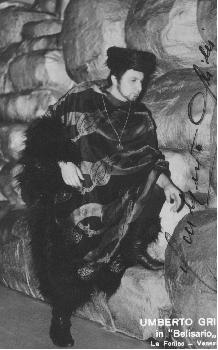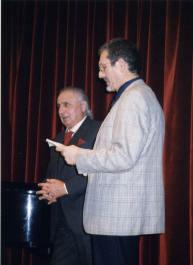Both his father and his elder brother were sculptors, so he knew what he certainly did not want
to do in life. He studied voice instead, in Milano with Adelaide Saraceni. He started his career in 1957 as a baritone (debut
as Silvio at the Politeama in Genova).
In 1959, he switched to tenor (debut as Amico Fritz at the Teatro Nuovo in Milano). He became soon successful in Italy: at
La Scala, at the Teatro dell'Opera in Rome, at La Fenice, at the Maggio musicale in Florence, in Bologna, Trieste, Palermo,
Torino, Parma...
Internationally, he appeared at the Vienna Staatsoper, in Hamburg, Monte Carlo, at the Colón in Buenos Aires, in Dallas,
Philadelphia, Amsterdam, Warsaw, Bucharest, Nice, Toulouse, Bordeaux, Lyon, at the festivals in Bregenz, Glyndebourne and
Edinburgh.
His repertory was focused on belcanto operas: La donna del lago (where he sang Rodrigo), Anna Bolena, Maria Stuarda, La pietra
del paragone, Oberto conte di San Bonifacio, Belisario, Elisabetta regina d'Inghilterra, Lucrezia Borgia, Maria di Rohan, I
lombardi alla prima crociata, La favorite, Don Pasquale... He also sang Arnold, Gérald, Duca, Pinkerton, Cavaradossi,
and was obviously the less convincing the farther the music was from belcanto. He was often the second cast after Luciano Pavarotti, although his voice seems to have been way larger than Pavarotti's; ear
witnesses testify to rarely having heard such an impressively resounding voice in a theater, and such a secure top.
He retired early, in 1987, and started teaching voice; Ambrogio Maestri was his best-known student.
Reference 1: Kutsch & Riemens; reference 2; reference 3; reference 4: La Provincia Pavese, 2 October 2019

